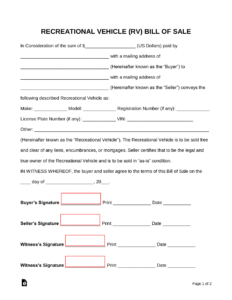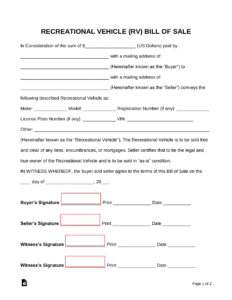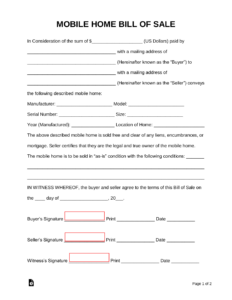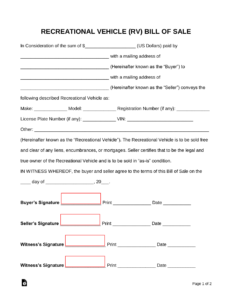Buying or selling a camper is an exciting adventure, whether you’re upgrading to a newer model or finally getting your foot in the door of the RV lifestyle. It’s a significant transaction, involving a considerable investment, and just like any major purchase, it comes with its share of paperwork. Navigating this process smoothly ensures peace of mind for both the buyer and the seller.
While the thrill of hitting the open road in your new (or newly sold) mobile home is undeniable, don’t let the excitement overshadow the importance of proper documentation. A crucial step in any camper transaction is ensuring you have a legally binding record of the sale. This is where a well-crafted document becomes indispensable for protecting your interests.
Why a Camper Bill of Sale is Your Best Friend
A bill of sale for a camper isn’t just a formality; it’s a vital legal document that serves as proof of the transaction between a buyer and a seller. Think of it as the receipt for your recreational vehicle, but with a lot more legal weight. It formally transfers ownership and outlines the terms and conditions of the sale, protecting both parties from potential disputes down the line. Without it, you could face issues with registration, insurance, or even legal challenges regarding ownership. It clearly states who sold what to whom, for how much, and when.
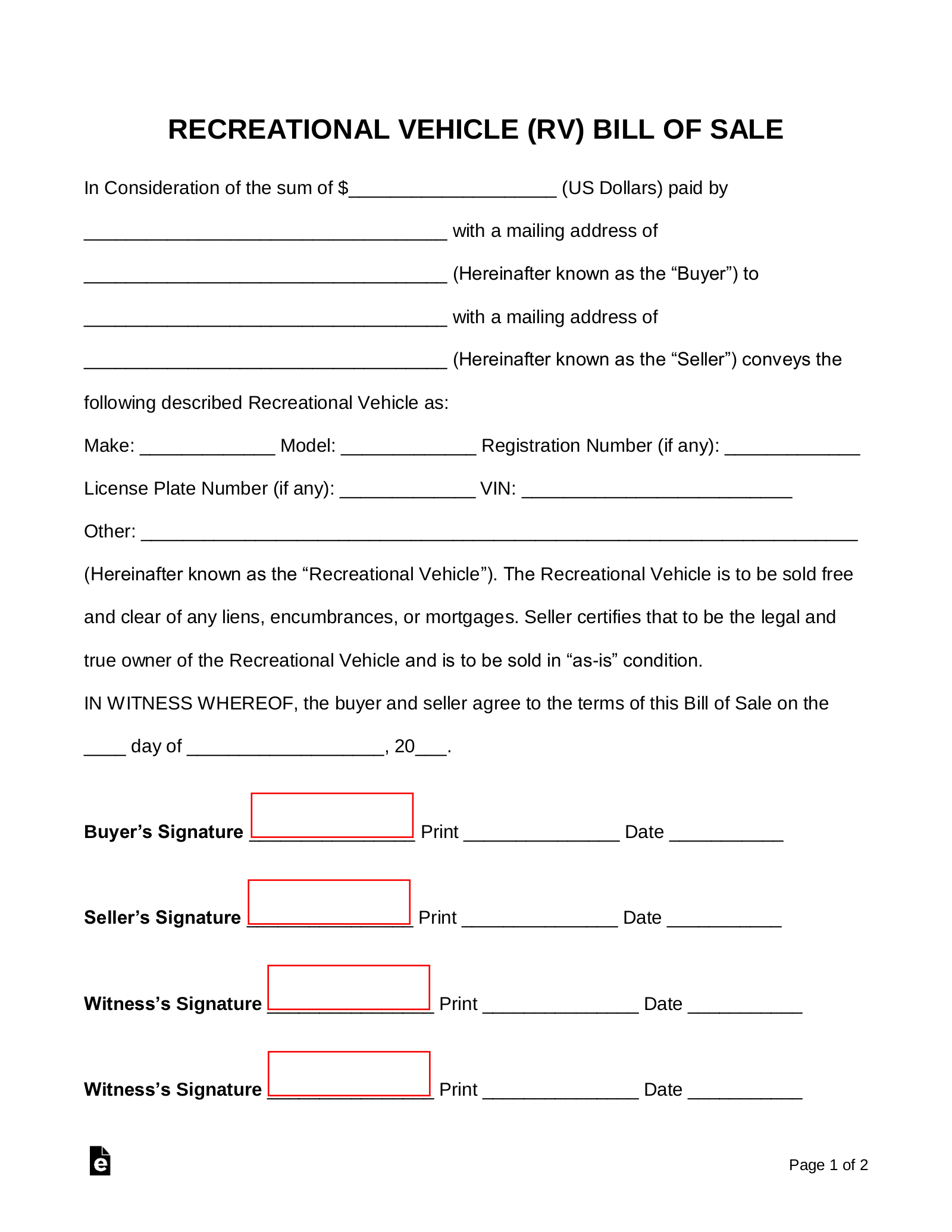
This document is absolutely essential for the buyer to register the camper with their state’s Department of Motor Vehicles (DMV) or equivalent agency. It’s also often required by insurance companies when you go to insure your new asset. For the seller, it provides a clear record that they are no longer the owner, which is crucial for tax purposes and liability, especially if there are any issues with the camper after the sale. It’s the ultimate evidence that the camper is no longer their responsibility.
Key Information to Include
A comprehensive camper bill of sale template should always contain several critical pieces of information to make it legally sound and effective. Omitting any of these details could weaken the document’s validity and create headaches later. Here’s what you absolutely need to make sure is present:
- Seller’s Details: Full legal name, address, and contact information.
- Buyer’s Details: Full legal name, address, and contact information.
- Camper Description: Make, model, year, Vehicle Identification Number (VIN), odometer reading, and a clear description of its condition.
- Sale Price and Payment Terms: The agreed-upon purchase price and how the payment was made (e.g., cash, check, bank transfer).
- Date of Sale: The exact date the ownership transfer occurred.
- Signatures: Signatures of both the buyer and the seller, ideally with a space for a witness or notary public if required by your state.
Ensuring all these details are accurately filled out and legible is paramount. A clear and precise camper bill of sale template leaves no room for ambiguity, safeguarding the interests of both parties involved in the transaction. It’s an investment in future peace of mind.
Tips for a Smooth Camper Sale or Purchase
Whether you are the buyer or the seller of a camper, a few thoughtful steps can make the entire process much smoother and more secure. Communication is key; ensure that both parties are clear on the terms of the sale, the condition of the camper, and the payment schedule before the actual exchange takes place. This upfront clarity helps prevent misunderstandings later on and builds trust between individuals, which is especially helpful in private sales.
For buyers, a thorough inspection of the camper is highly recommended before finalizing any deal. This includes checking the interior, exterior, appliances, and mechanical components. If you’re not mechanically inclined, consider hiring a professional RV inspector. This small investment can save you from significant repair costs down the road and provides leverage for negotiating the price if issues are found. Don’t be shy about asking questions and getting all your concerns addressed before signing on the dotted line.
Sellers, on the other hand, should be transparent about the camper’s condition, including any known defects or past repairs. Providing maintenance records and receipts can build buyer confidence and demonstrate the care you’ve taken of the vehicle. A clean and well-maintained camper, coupled with honest communication, will not only help you sell faster but also ensure the buyer is satisfied, reducing the likelihood of post-sale complaints.
Once the sale is agreed upon, make sure to complete all sections of the bill of sale accurately and legibly. It’s always a good idea for both the buyer and the seller to keep a signed copy of the document for their records. For an added layer of legal security, especially for high-value transactions, consider having the bill of sale notarized. This provides official verification of the signatures and can be particularly useful if any disputes arise.
Securing a reliable bill of sale is not just about fulfilling a requirement; it’s about laying a solid foundation for a worry-free transfer of ownership. It protects your interests, simplifies administrative tasks, and gives you the confidence to move forward with your recreational vehicle adventures. By taking the time to properly document the sale, you ensure a clear and indisputable record of the transaction.
